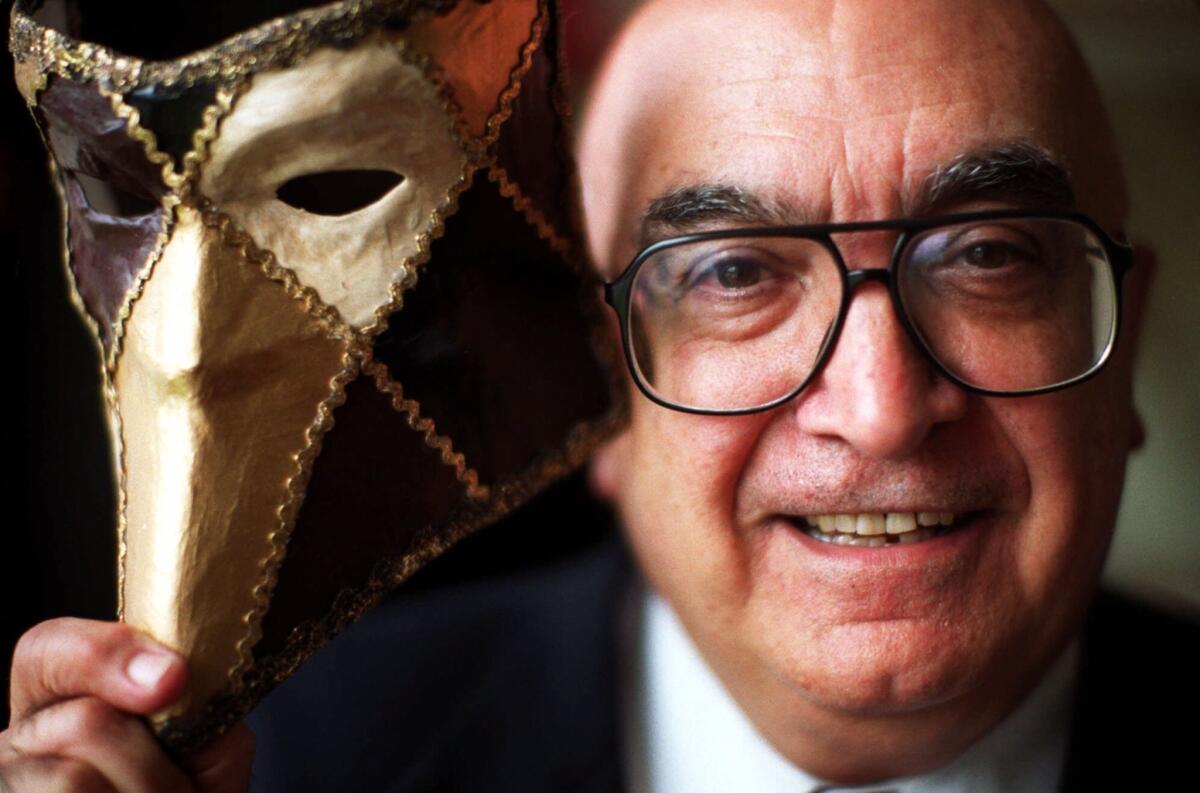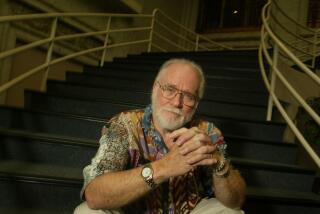Lotfi Mansouri dies at 84; opera director who championed ‘supertitles’

Lotfi Mansouri, the spirited former general director of the San Francisco Opera whose desire to democratize the operatic experience for a modern audience spurred the use of projected translations in performances, has died. He was 84.
Mansouri died Aug. 30 at his home in San Francisco from complications of pancreatic cancer, the San Francisco Opera said.
The Iranian-born opera director and administrator ran the San Francisco company from 1988 to 2001, taking on ambitious commissions such as Jake Heggie’s “Dead Man Walking” and Andre Previn’s adaptation of the Tennessee Williams classic “A Streetcar Named Desire.” He oversaw the company’s first commercial recordings, as well as the first San Francisco productions of many Russian operas.
Mansouri came to San Francisco from the Canadian Opera Company in Toronto, where he worked as general director for 12 years. During a January 1983 performance of Richard Strauss’ “Elektra,” Mansouri introduced what became known as “supertitles,” or projected translations of the libretto onto screens above the proscenium.
In his 2010 memoir, “Lotfi Mansouri: An Operatic Journey,” Mansouri described the introduction of supertitles as one of his proudest achievements, tailored to an audience unlikely to be familiar with the language or well-versed in the libretto.
“For millions of people, they have made opera a comprehensible art form,” Mansouri wrote, adding: “Supertitles are the most democratic and liberating tool we can employ in the modern era.”
He credited the idea of the projected translations to his wife, Midge, who remarked while watching a televised production of Richard Wagner’s “Die Walkure” with subtitles for the first time: “You know, Lotfi, this isn’t as dumb as I thought it was.”
Supertitles initially repulsed opera purists — James Levine, music director of the Metropolitan Opera in New York, famously declared that only “over my dead body” would the projections ever appear at the Met.
It didn’t take long, however, for professional companies to begin adopting the innovation, with the New York City Opera becoming the first American house to use the titles in September 1983. The system spread internationally, and in 1995, after more than a decade of stubborn resistance, the Met introduced a copyrighted system called “Met Titles,” the installation of display screens on seat backs that can be turned on or off.
“It seems unthinkable now to attend an opera without titles,” Marcia Adair wrote in The Times in May.
Lotfollah Mansouri, known as Lotfi, was born June 15, 1929, in Tehran. He was an only child in an affluent household whose father was a member of a conservative family and a distant man who rarely showed emotion. His mother, by contrast, belonged to an avant-garde family that adopted Christianity and whose family members studied in France.
Mansouri cultivated the beginnings of a lifelong love of cinema and movie stars in Tehran. He went with his mother to see Greta Garbo in “Anna Karenina” and, as he grew older, got into the habit of sneaking off to the cinema after school.
When Mansouri graduated from high school, his father chose his career path for him — studying medicine at the University of Edinburgh in Scotland. Mansouri, however, fought and won permission to attend UCLA, a university “close to Beverly Hills and my beloved movie stars,” he later wrote.
He entered the pre-med program at UCLA in fall 1948, but the heavy course load overwhelmed him. To ease the burden of homework, Mansouri’s student adviser suggested enrolling in a choir class.
Three years later, Mansouri made his first professional stage appearance carrying a spear in a production of “Otello.” He dropped the pre-med path, switched to psychology and embraced a newfound infatuation with opera, which cost him the financial support of his father.
To support himself, Mansouri took jobs that included working behind the checkout counter at a grocery store in Beverly Hills, where the star-struck Iranian waited on Zsa Zsa Gabor as she purchased cases of frozen fish for her cats. In 1956, a resemblance to the Italian tenor Enrico Caruso landed him a role as Caruso in an episode of a television series.
He graduated from UCLA, married Marjorie Thompson (Midge), and won a scholarship to the Music Academy of the West in Santa Barbara, where he trained as a tenor under opera star Lotte Lehmann. He moved to Switzerland in 1960 and worked as stage director of opera houses in Zurich and Geneva until he relocated to Canada in 1976.
Mansouri retired from his San Francisco post in 2001. In 2009, a bas-relief of his likeness was installed in the main foyer of the San Francisco War Memorial Opera House.
“Basically, I want to stop and smell the roses. I’ve been a general director a long time now,” Mansouri told The Times in 2000, as he was preparing for his final season in San Francisco. “One of the first things I learned in opera was that you need to make good entrances and exits. It’s time.”
In addition to his wife, Mansouri is survived by his daughter, Shireen.
More to Read
Start your day right
Sign up for Essential California for the L.A. Times biggest news, features and recommendations in your inbox six days a week.
You may occasionally receive promotional content from the Los Angeles Times.






